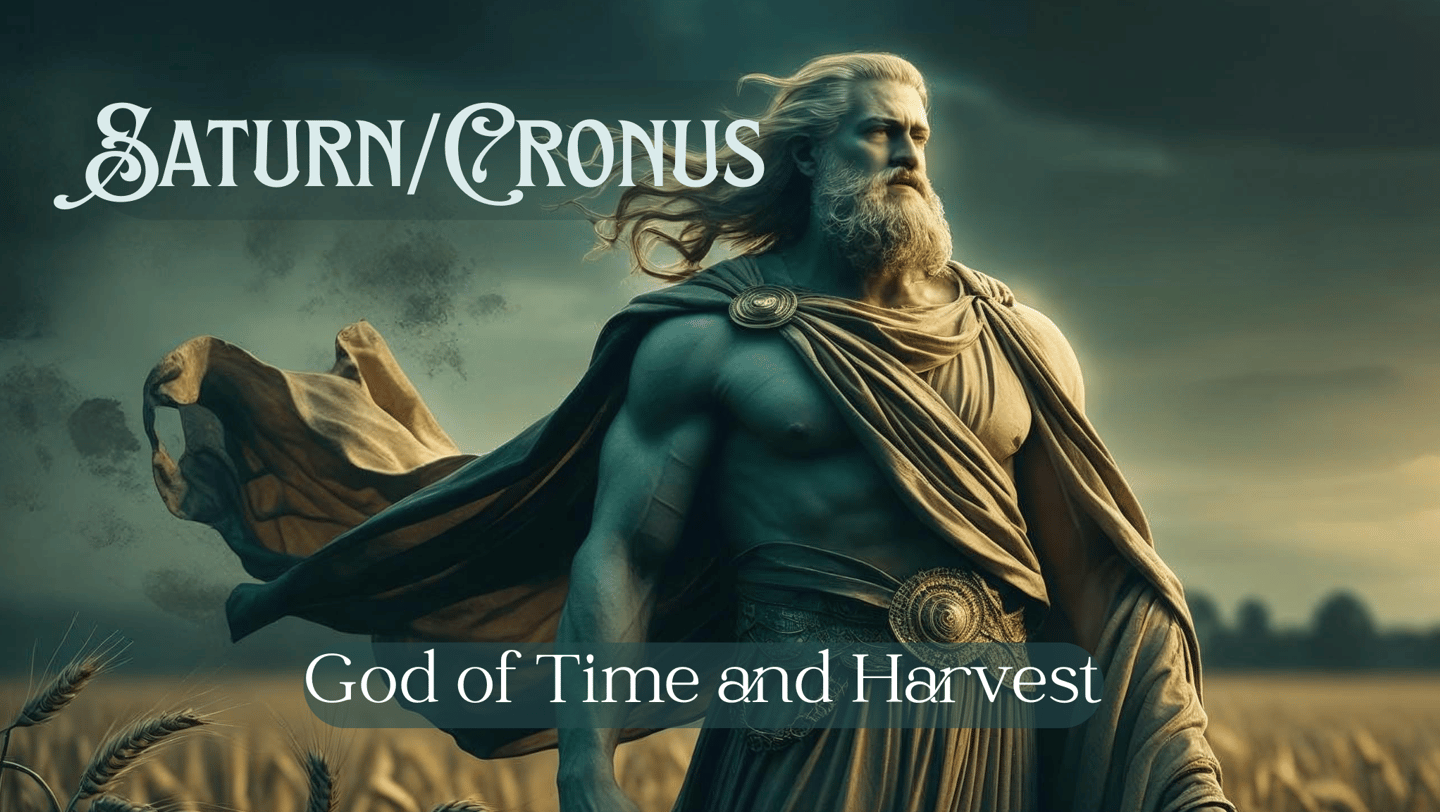The Rise of Cronus
In Roman mythology, Saturn is the god of time, harvest, and agriculture. He is often associated with the cyclical nature of life, representing the inevitable passage of time and the importance of planning for the future. The Greek counterpart of Saturn is Cronus, one of the most significant and complex figures in Greek mythology. Cronus’s story reflects many of the astrological themes associated with Saturn, particularly around control, authority, and the consequences of one’s actions.


In Greek mythology, Cronus was the youngest of the Titans, born to Gaia (Earth) and Uranus (Sky). Uranus, fearing that his children would one day overthrow him, imprisoned them deep within the Earth. Gaia, distressed by this, convinced Cronus to overthrow his father. Armed with a sickle, Cronus attacked Uranus and took control, establishing himself as the ruler of the cosmos. This act of rebellion shows Saturn’s association with power, control, and the consequences of authority.
The Prophecy and the Cycle of Time
After taking power, Cronus was warned by a prophecy that one of his own children would overthrow him, just as he had overthrown his father. In an attempt to prevent this, Cronus swallowed each of his children as they were born. However, his wife, Rhea, managed to save their youngest child, Zeus, by tricking Cronus into swallowing a stone instead. Zeus eventually grew up, overthrew Cronus, and freed his siblings, fulfilling the prophecy. This myth illustrates Saturn’s connection to time, the cycle of life, and the inevitability of fate.
Saturn as the God of Agriculture


In Roman mythology, Saturn was also seen as the god of agriculture and the harvest, representing the rewards of hard work and careful planning. The Romans honored him with a festival called Saturnalia, which celebrated the end of the agricultural season and the beginning of winter. This aspect of Saturn’s mythology aligns with its astrological themes of discipline, patience, and the eventual rewards of sustained effort.
The Symbolism of Saturn:
Discipline, Time, and Karma
Saturn’s astrological symbolism reflects the major themes of its mythology—control, time, and the consequences of power. Here are some of the key themes associated with Saturn:
Discipline and Structure: Saturn demands that we take responsibility for our actions and approach life with discipline and structure. Just as Cronus overthrew his father to gain control, Saturn’s energy pushes us to confront challenges, set boundaries, and take control of our own lives.
Time and Maturity: Saturn governs time, aging, and the need for patience. Its lessons are often slow-moving, requiring long-term planning and sustained effort. This connection to time is reflected in Cronus’s role as the god of time and the inevitable passage of years.
Karma and Consequences: Saturn’s influence is often associated with karma—the idea that our actions have long-lasting consequences. Cronus’s attempt to avoid his fate by swallowing his children only led to his eventual downfall, illustrating the karmic theme of Saturn: what we try to control often returns to us in unexpected ways.
Authority and Power: Saturn also represents authority and the structures that govern society, from governments to personal rules. In the myth of Cronus, his desire for power and control led to both his rise and his eventual fall, showing the importance of wielding authority with wisdom and restraint.
Saturn in Astrology: Placement and Influence
Saturn’s placement in the birth chart reveals where we face challenges, where we need to grow through discipline, and where we must take responsibility.
Saturn in the Signs: Saturn’s sign placement shows how we approach discipline, challenges, and personal responsibility. For instance, Saturn in Capricorn is strong and focused on building long-term success, while Saturn in Pisces may struggle with boundaries and emotional responsibility.
Saturn in the Houses: The house Saturn occupies in your chart reveals the area of life where you will face your greatest challenges and where you must develop maturity and patience. For example, Saturn in the 10th house may bring challenges related to career and public image, while Saturn in the 7th house could highlight difficulties in relationships.
Saturn Aspects: Aspects to Saturn from other planets influence how we experience its energy. A positive aspect from the Sun might help you develop confidence in handling responsibilities, while a challenging aspect from Mars might bring frustration or delays in pursuing your goals.
The Saturn Return: A Time of Reckoning
One of the most significant astrological events associated with Saturn is the Saturn Return, which occurs approximately every 29–30 years. During a Saturn Return, Saturn returns to the same position it was in at your birth, marking a period of major life transitions and challenges.
First Saturn Return (around age 29–30): The first Saturn Return is often seen as a rite of passage into true adulthood. It’s a time when many people confront major decisions regarding their careers, relationships, and life purpose. Saturn forces you to evaluate your life choices, helping you to shed what no longer serves you and build a more solid foundation for the future.
Second Saturn Return (around age 58–60): The second Saturn Return often brings a time of reflection and reassessment as people approach the later stages of life. It’s a time for re-evaluating long-term goals, financial security, and your legacy.
Saturn Retrograde: Saturn retrograde occurs annually for about four and a half months. During this time, we are called to reflect on our responsibilities, goals, and how we are handling challenges. It’s a period for reviewing our progress and making adjustments to ensure long-term success.
Conclusion
Saturn, both in astrology and mythology, represents discipline, structure, and the unavoidable passage of time. As the “taskmaster” of the zodiac, Saturn pushes us to face challenges head-on, teaching us the value of hard work, patience, and perseverance. Through the mythology of Cronus, we see Saturn’s influence reflected in the cycles of time, the consequences of power, and the inevitability of growth through discipline.
In astrology, Saturn’s lessons may not always be easy, but they are necessary for building a strong foundation for the future. Saturn encourages us to embrace responsibility, set boundaries, and approach life with a practical mindset. By working with Saturn’s energy, we can develop resilience, wisdom, and the ability to overcome obstacles with grace and determination.


